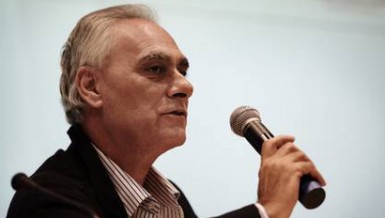
By James M. Dorsey
Football is defeating efforts by wealthy Gulf States to impregnate themselves against the wave of protests that have swept the Middle East and North Africa in the past two years and sparked a brutal civil war in Syria.
Once a prince’s uncontested playing ground that allowed royals to curry favour, strengthen their families’ grip on power, and ensure that the football pitch did not become a platform for social and political protest, the beautiful game is emerging as the one arena that so far has proven immune to efforts by Gulf rulers to keep demands for change at bay.
In fact, fans are voting with their feet. Not in mass protests like those that toppled the leaders of Egypt, Tunisia and Yemen, but by staying away from matches. What effectively amounts to a fan boycott is most evident in Qatar and Saudi Arabia. At a recent match in a dilapidated stadium in Doha, barely a hundred people showed up to watch.
In staying away, fans are demonstrating that stadiums in the smaller Gulf states where local nationals account for at most some 40% of the population are not simply empty because of a lack of bodies and a politically inspired refusal to attract non-nationals.
In fact, irrespective of demography, the drop in stadium attendance is proving to be part of an unspoken resistance to control by royal autocrats. As a result, countries like Saudi Arabia and Qatar are looking at restructuring ownership of their premier league clubs to put an unprecedented distance between members of the ruling elite and the game.
Protest against performance and royal interference has had the most far-reaching effect in Saudi Arabia where princes are known to phone during a match to order the change of a player. In an unprecedented move in a football-crazy region in which rulers see political control of sports as essential, fan pressure forced Prince Nawaf bin Faisal, the former head of the Saudi Football Federation, to last year become the first royal to resign from leadership of a sports association. The resignation followed Australia’s defeat of the Saudi national team in a 2014 World Cup qualifier.
The move paved the way for a rare election in a nation that sees free and fair elections as an inappropriate Western concept and the takeover of the federation by a storied former goalkeeper, known to be a reformer and a proponent of women’s football in a country that frowns on women’s sports. For now, Prince Nawaf and the Saudi royal family retain their control of football through the Saudi Olympic Council and the General Presidency of Youth Welfare which the prince continues to chair.
As part of the kingdom’s first five-year national sports plan being drafted, albeit for men only, Prince Nawaf’s youth welfare presidency is proposing to privatise Saudi football clubs, use the proceeds to improve the country’s infrastructure, and restructure its league with the English Premier League as its model. The new league would be able to increase revenues from broadcast rights.
“We are not only trying to make money, the aim of what we are trying to do is raise the level of sports in Saudi and in order to do so I think you need to have healthy club finances so they can afford to bring the best coaches, the best foreign players. And when you raise the level of Saudi clubs, you raise the level of the national team,” said Prince Abdullah bin Mosaad bin Abdulaziz Al Saud, who heads the committee planning the restructuring, in an interview with The Wall Street Journal.
Bio:
James M. Dorsey is a senior fellow at the S. Rajaratnam School of International Studies, director of the University of Würzburg’s Institute of Fan Culture, and the author of The Turbulent World of Middle East Soccer blog


